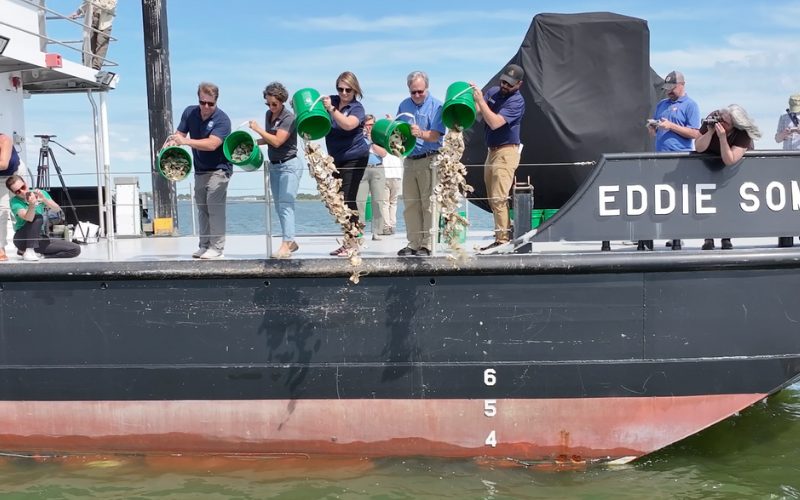
Photo Credit: Maryland Department of Natural Resources, Winn Brewer
The late August announcement by Governor Wes Moore marked a historic milestone: Maryland has completed its commitment to restore oyster populations in five Chesapeake Bay tributaries with the completion of the Manokin River! At a grand total of 455 restored acres, the Manokin River Sanctuary is the largest individual oyster restoration project in the world.
But what does it actually take to plant 1.4 billion oysters? Behind the headlines is a story more than three decades in the making — one that ORP has been proud to help write since our founding in 1994. ORP played a key role in planning, coordinating, and implementing several components of the restoration effort to achieve this milestone.
Take a Look Behind the Scenes of the Manokin’s Restoration
Shell Recycling & Acquisition
ORP recycled and repurposed more than 170,000 bushels of shucked oyster shell through our Shell Recycling Alliance and regional shucking houses. This shell became the essential foundation for new oyster reefs.
Spat-on-Shell Production
ORP and the University of Maryland Center for Environmental Science’s Horn Point Lab hatchery produced spat-on-shell at the setting pier, producing 1.4 billion baby oysters growing on recycled shell.
Planting Spat-on-Shell
ORP and our watermen partners made over 90 eight-hour trips (one-way!) aboard vessels: Robert Lee, Poppa Francis, and M. Tawes, each ferrying tens of millions of spat-on-shell from hatchery to river, where they were carefully planted on restored reefs.
Documenting Plantings
ORP scientists managed in-water work using geospatial software to ensure spat-on-shell was planted in the precise locations designed to ensure reef success.
Looking Ahead
The completion of the Manokin River is a major victory, but it’s not the end of the story. ORP and our partners are already working on defining the next steps for large-scale oyster restoration, as well as conducting in-water work in other locations to continue building healthy, productive oyster reefs that will filter water, provide habitat, and support the Chesapeake Bay economy.
The next chapter depends on your support. Here are a few simple ways you can help:
- Become a Reef Champion: Make a monthly contribution to ORP that supports oyster restoration efforts.
- Celebrate with us at World is Your Oyster Fest (October 2, 2025 at the B&O Railroad Museum in Baltimore)!
